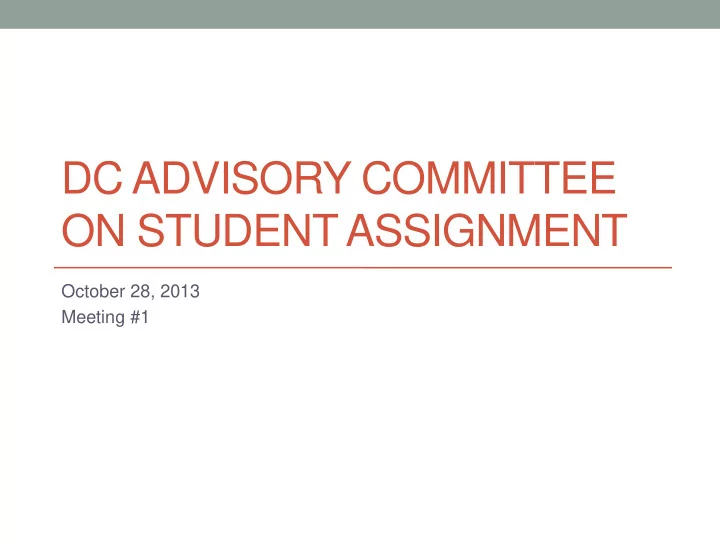

DC ADVISORY COMMITTEE ON STUDENT ASSIGNMENT October 28, 2013 Meeting #1
Goals for Today’s Meeting • Understand the role of the Committee, the process, timeline, and goals of the initiative • Agree on norms and expectations for the group • Understand basic framework of current student assignment policies • Identify core set of values that will guide the policy review and planning process
Challenging Landscape for Families • 31 neighborhood schools closed and boundaries consolidated since 2007 (58 DCPS schools closed since 1996) • Confusion about new feeder opportunities • Lack of programmatic continuity for DCPS and PCS • Uncertainty about the quality of school options, particularly secondary schools • Low chances for lottery access to high demand schools • Only lottery based early childhood seats • Insecurity in schools accessed through lotteries • High threshold for selective admissions DCPS high schools • Little unbiased guidance for families making public education choices • Lack of confidence that parents/community can affect school quality
Challenging Landscape for DC The last comprehensive review of policies was done in 1968. Since then: • Significant change in child population Decline from 2000 to 2010 Increases projected for 2010-2020 • Significant changes in school supply • High levels of student mobility within and between LEAs and region • PK-12 public school infrastructure spending
Goals of Initiative • To develop fair and clear school choice and assignment policies • To clarify what rights and responsibilities families and schools have regarding access to public schools • To update feeder relationships between schools • To ensure that the boundaries align to the DCPS facility capacity and projected population of students • To explore opportunities to bridge student-assignment and choice policies across DCPS and charter schools
Charge of Advisory Committee • Review current citywide policies on attendance zones, feeder patterns and school choice • Formulate guidelines and principles for public school assignment and choice policies and practices • Listen to the community and serve as insightful interpreters of public sentiment, concerns, and questions • Develop recommendations and scenarios for revised DCPS attendance zone and feeder patterns • Make recommendations on how to bridge student-assignment and choice policies across DCPS and charter schools
Role of Technical Team • Support the Advisory Committee and the DME with policy and data analysis • Translate policy scenarios and recommendations into revised boundaries and feeder patterns • Draft report and recommendations, based on work of the Committee and public input • Conduct focus groups • Facilitate working group meetings
Public Engagement Process and Timeline Jan Oct Nov Dec Feb Mar Apr May Jun Jul Aug Sept 2014 Final Release Release Cmte. Advisory Committee Meetings Cmte. Final Proposal Meeting Meeting Plan City-wide Focus Groups, Surveys and Community Working Groups community Outreach Meetings meetings Focus Groups. Opportunity to express concerns and provide in-depth input into principles and values to guide the Advisory Committee. Working Groups. Opportunity to vet policy scenarios being considered by the Committee and how they might impact specific geographic areas. EngageDC.org. Online forum where the public reviews the materials from the Committee meeting and shares ideas. Citywide community meetings. Opportunity to provide feedback on proposed policy, boundary and feeder recommendations released in May. Online survey. Opportunity to provide feedback on-line on proposed policy, boundary and feeder recommendations released in May.
Decision Making Process • Advisory Committee submits preliminary report with recommendations on policy, boundaries and feeder relationships to Deputy Mayor for Education; • Deputy Mayor for Education reviews with Chancellor and Public Charter School Board and brings comments back to Advisory Committee for review and revision; • Advisory Committee revises preliminary report and submits final report and recommendations to the DME; • DME accepts final proposal from Committee and submits to Mayor; and • Sept 2014: Mayor releases final changes to policies and practice of DCPS, including new boundary lines and feeder patterns, where applicable
Group Norms and Expectations We want members to: • Act as public ambassadors for the process • Advocate for what is right for all students and families and not just what is right for one particular school community • Be open-minded • Genuinely consider alternatives to their own opinions • Respect each other’s opinion • Focus on creative solutions
Overview of Current Policies Student assignment policies (DCMR Chapters 20 & 21) • DCPS attendance boundaries for neighborhood public schools • DCPS feeder patterns • Administrative assignment School choice policies (DCMR Chapters 20 & 21, School Reform Act, FED voucher law) • Selective admissions DCPS schools • Out of boundary placement • Charter school access • Voucher access
Defining Guiding Principles • Complete the Guiding Principles worksheet, rating each principle 1-5 (5 as most important) • Add principles that you think are missing; • Share your responses with your group; • Fill out another worksheet with the consensus rating of your group; • Share out your group’s ratings and comments; • Committee will discuss ratings and rank the principles as a Committee.
Next Steps Homework • Review meeting notes before public posting on www.DME.dc.gov • Familiarize yourself with the binder materials • Read Policy Memo #1 and be prepared to bring comments and questions November Meeting • Meeting time options • Goals for next meeting Review policy memo Understand the impact of current policies Identify the biggest challenges Review criteria for evaluating if proposed solutions are successful
Recommend
More recommend